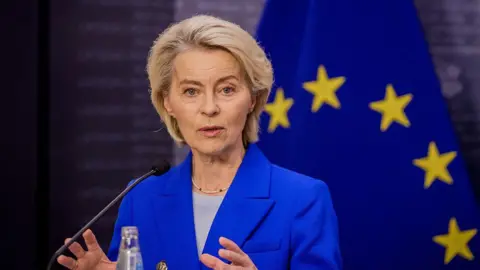In a historic political crisis, Romania prepares for vital elections this weekend after last December's presidential race was abruptly annulled. This turmoil stemmed from unexpected allegations against far-right candidate Calin Georgescu, who claimed the election's legitimacy was undermined by Russian interference and dubious TikTok maneuvers. Georgescu's initial victory, which garnered near 23% of the vote, was overshadowed by the contention that his rise was artificially fostered by social media influencers and a network of fraudulent accounts designed to elevate his profile while compromising democratic integrity.
Authorities have focused on suspicious TikTok activity, claiming that over 100 influencers were incentivized to create content favoring Georgescu, employing covert strategies that amplified his visibility without directly naming him. Prominent influencers were reportedly compensated through the marketing platform FameUp, which allowed them to disseminate messages about desired presidential attributes without transparency regarding the origin of funding. This lack of disclosure violated TikTok's regulations prohibiting political advertisements.
The case escalated with the revelation that the hashtag campaign “stability and integrity,” purportedly independent, was linked to the center-right National Liberal Party, further complicating the motivations behind influencer involvement. Calls to action emerged through various videos, leading to a flood of pro-Georgescu comments that many believe manipulated TikTok's algorithm to the candidate’s favor—despite the app’s removal of thousands of inauthentic accounts.
The situation intensified when Bogdan Peschir, dubbed the "King of TikTok," was arrested for allegedly leveraging substantial influencer gifts to coerce voter allegiance toward Georgescu, though he claimed his support was mischaracterized. Influencer responses reflect a mix of bewilderment and denial concerning their roles, emphasizing the complexities of navigating political dialogue through digital mediums.
The lack of solid evidence substantiating Russian meddling has left many Romanians frustrated amidst ongoing investigations by local and European authorities. The political ramifications remain fraught with uncertainty, leaving citizens eager for clarity as they head towards the polls with heightened awareness of the power and potential pitfalls of social media in electoral processes.
Authorities have focused on suspicious TikTok activity, claiming that over 100 influencers were incentivized to create content favoring Georgescu, employing covert strategies that amplified his visibility without directly naming him. Prominent influencers were reportedly compensated through the marketing platform FameUp, which allowed them to disseminate messages about desired presidential attributes without transparency regarding the origin of funding. This lack of disclosure violated TikTok's regulations prohibiting political advertisements.
The case escalated with the revelation that the hashtag campaign “stability and integrity,” purportedly independent, was linked to the center-right National Liberal Party, further complicating the motivations behind influencer involvement. Calls to action emerged through various videos, leading to a flood of pro-Georgescu comments that many believe manipulated TikTok's algorithm to the candidate’s favor—despite the app’s removal of thousands of inauthentic accounts.
The situation intensified when Bogdan Peschir, dubbed the "King of TikTok," was arrested for allegedly leveraging substantial influencer gifts to coerce voter allegiance toward Georgescu, though he claimed his support was mischaracterized. Influencer responses reflect a mix of bewilderment and denial concerning their roles, emphasizing the complexities of navigating political dialogue through digital mediums.
The lack of solid evidence substantiating Russian meddling has left many Romanians frustrated amidst ongoing investigations by local and European authorities. The political ramifications remain fraught with uncertainty, leaving citizens eager for clarity as they head towards the polls with heightened awareness of the power and potential pitfalls of social media in electoral processes.



















